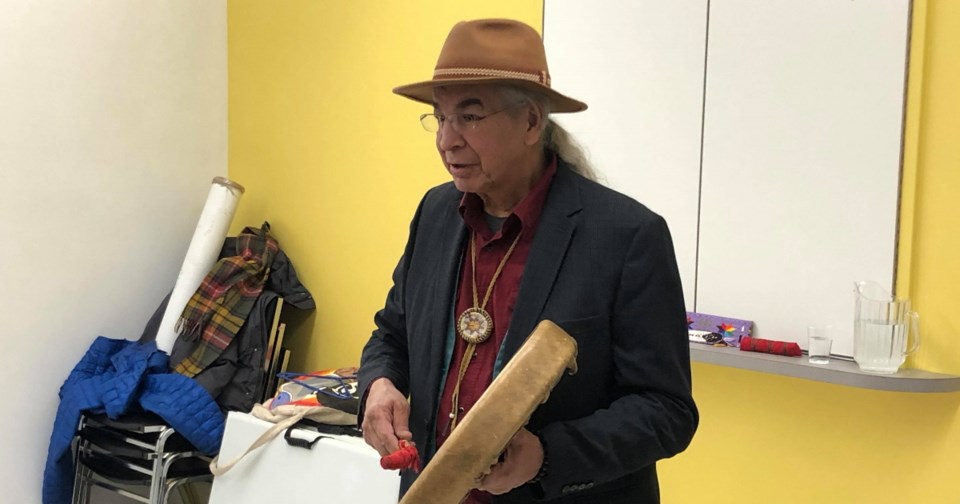HUMBOLDT — Joseph Naytowhow gave visitors to the Reid-Thompson Public Library a rare treat.
The Plains/Woodland Cree storyteller, actor, and singer/songwriter from Sturgeon Lake First Nation came on Feb. 19 to share traditional songs and stories of the Cree.
For Naytowhow, sharing these stories to all who come to his presentations is about building relationships with all people.
“When I tell these stories, what I find is we’re still working on good relationships between ourselves. It was obvious to me to tell these stories to the kids because as they grow up, they remember.”
Naytowhow was taken from his family at the age of six to go to a residential school. After 13 years, Naytowhow said he was left with a lot of anger and felt disconnected from his culture. He does not want to know what would have happened if he had decided a different path for his life.
Even at the age of 67, Naytowhow said he can still feel the mental and emotional impacts of residential schools and has to give himself time to recover after he does more serious presentations about residential school trauma. But moving past that has saved him from a life he doesn’t want to imagine. Turning to the elders for inspiration and choosing to share traditional stories is what helps, he said.
“The only way I could feel at peace was to tell stories through the eyes of our old people.”
This path made sense, he said, to find kwayask kîkway – balance – in his life.
“When you come out of that residential school after 13 years you’re full of self-hatred, or you want to lash out, or you just withdraw inside... What helped was to tell a story, any story.”
Naytowhow tried to tell stories about residential schools but he did not see those stories of tragedy helping his anger.
Part of his healing has also included waking up each day with nanâskomowin, thankfulness, he said.
It can be difficult to take responsibility for our actions, Naytowhow said, but everyone has to start listening and stop blaming others for their situation.
“If you remain a victim, you’re going to always blame something or someone or else do harm to yourself. That’s what I’ve seen.”
We all need patience if we are going to reconcile and make the world a better place, he said, and that will take listening, even when people are angry.
“They need to hear what that person, that indigenous person, is saying. They’re in pain. The fact that you just listen to them is enough. Maybe their message is upside down and backwards but you listened, and that’s enough.”
Naytowhow’s presentation was sponsored by SaskPower, Saskatchewan Indian Gaming Authority, SaskCulture, Saskatchewan Lotteries, Community Initiatives Fund, Saskatchewan Arts Board, Saskatchewan Government and SaskTel.



